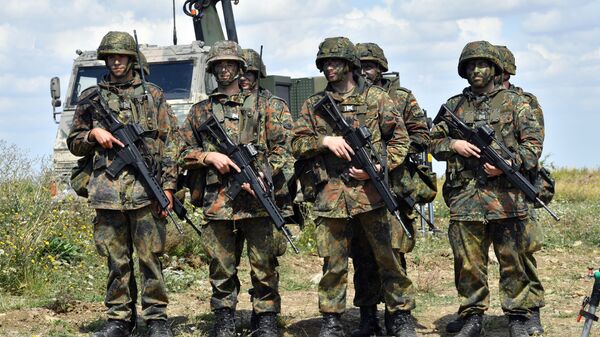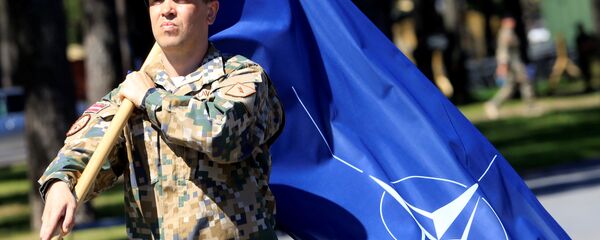Malte Heidorn and Jan Marose of Germany's Left Party recently visited the German military base of Rukla in Lithuania, ahead of the upcoming NATO Trident Juncture drills. Set to kick off in Norway later this month, Trident Juncture is being touted as NATO's largest drill in many years and will involve 40,000 participants, 130 aircraft and 70 vessels from more than 30 nations.
Long-term Military Presence
The forthcoming NATO drills in Norway have political undertones, cause many questions and, without any doubt, are disproportionately extensive.They send out an erroneous signal indicating potential confrontation, especially given the moment at which they will take place.
NATO, however, continues to adhere to its Enhanced Forward Presence concept, and the alliance's forces are stationed in all three of the Baltic States as well as in Poland with the aim of "deterring Russia." This long-term military presence specifically stipulates that German troops will remain in Lithuania, at least until 2025.
READ MORE: Baltic States Ask US to Enhance NATO Battalions With Air, Naval Forces — Reports
Many residents of the Baltic countries believe in an alleged Russian threat. However, if you take a closer look at NATO's eastern expansion and weigh Russia's military spending compared to that of the alliance, you will understand that the Baltic fears reflect irrational thoughts rather than a specific scenario of developments.
Return to the Cold War?
European politicians should certainly account for the completely legitimate, as well as historically determined and understandable need of the Balts and Poles for security. But is it safe to assume that a return to the Cold War will indeed contribute to strengthening security? Should NATO and the EU, especially Germany and France, only focus on the Baltic countries and Poland when it comes to their stance on Russia?
After Crimea's reunification with Russia in 2014, NATO changed its strategy, alleging that the "annexation" of Crimea from Ukraine and the events in the country's east can be seen as evidence of the "Russian threat", due to which NATO countries should show more solidarity with each other.
READ MORE: NATO Not Planning to Increase Military Presence in Baltic Region — Stoltenberg
In 2016, NATO decided to deploy the so-called "combat groups" of soldiers from many countries to Poland, Estonia, Latvia and Lithuania, where they are tasked with helping the alliance repel any possible attack from Russia.
Uncontrolled Parliamentary Army
The NATO operation is led by the US in Poland, the UK holds the reigns in Estonia, Canada is present in Latvia and Germany – as well as in Lithuania.About 1,200 soldiers, including 550 German soldiers, are stationed in the Lithuanian town of Rukla. In addition, there are military from the Netherlands, the Czech Republic, Norway, Croatia and other countries. This grouping is subordinate to the command of the Lithuanian brigade "Iron Wolf".
Given that Lithuanian politicians put an irrational and often hysterical sense of danger at the forefront, this is dismal news. This NATO operation does not even envisage the Bundestag's go-ahead because within the framework of NATO there is a rule on the equal obligations of member states to take part in such operations. The fact that Bundeswehr forces can be sent to such an operation without any parliamentary or public debate is a big problem which is related to the parliamentary army.
The combat groups' deployment to the Baltic states runs counter to the 1997 NATO-Russia Founding Document, according to which the permanent presence of armed forces on certain territories is prohibited. Even if these forces change every six months due to rotation, and the German base in Rukla currently consists mainly of containers, this NATO operation is planned as a permanent one and stipulates German troops' presence in Rukla until 2025.
Foreign Policy's 'Ice Age'
Apart from the Baltic states and NATO leadership, many in the German government also believe that detente, dialogue and security can be achieved amid a drive for armament and a permanent military presence. Instead of realizing that the Cold War was a clear example of insecurity, these forces claim that the current foreign-policy "ice age 2.0" remains the best guarantor of security.
So the key question that arises is whether NATO forces are able to bring rationale to the currently "irrational" sense of threat that Lithuanians have. After all, the threat they feel should be real, given that NATO is sending its soldiers to defend them.
Militarization of Lithuanian Society
The NATO presence also intensifies the tendency towards the militarization of society in Lithuania, where defense spending has quadrupled since 2011 and is approaching 2.5 percent of the Gross Domestic Product. Also, 10–12 year-old children undergo military training in Lithuanian schools, with thousands of Lithuanians joining the National Guard and having the right to keep firearms at home. And this trend in Lithuanian society will not change as long as there are foreign servicemen in the country.
READ MORE: 'Most Plausible Conclusion': NATO Sec Gen Alleges Russia Breached INF Treaty
At the same time, Lithuania has a lot of very different problems which are related to its own policy the priorities rather than Russia's. These include a list of serious social and economic challenges which have already compelled more than a million Lithuanians to leave the country. Many Lithuanian citizens already see poverty as something more than just an abstract threat because it has become part of their harsh everyday life.
But instead of actively tackling these problems, politicians prefer to insist on confrontation with Russia, a fact which is ignored by German political figures. They prefer to send the military to Lithuania instead of taking on the role of a mediator and helping build confidence between the Balts and the Russians. Germany has no plan on how to get out of this "spiral of deterrence" — neither in relations between Lithuania and Russia, nor between Germany and Russia.
Operation Without 'Exit Strategy'
Within the framework of the militaristic rationale, relations between Russia and the Baltic countries cannot be improved. NATO’s military presence in the region does not provide for simultaneous political process.
When the German government already pledges that its military will remain in Lithuania until 2025, this means that these promises are completely out of sync with the political development of Berlin's relations with Russia. So it turns out that Russia's future behavior does not matter.
After all, who will dare to tell the Lithuanians that NATO's military presence in their country will sooner or later come to an end? Those who send troops to conduct operations that are justified with an irrational sense of threat risk facing a virtually inescapable deadlock.
The views and opinions expressed in this article are those of the authors and do not necessarily reflect those of Sputnik.


